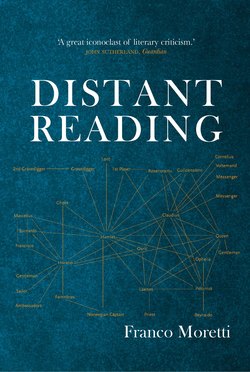Distant Reading

Реклама. ООО «ЛитРес», ИНН: 7719571260.
Оглавление
Franco Moretti. Distant Reading
Отрывок из книги
DISTANT READING
FRANCO MORETTI
.....
But more: isn’t there a sort of pact between mass literature and modernism—a sort of silent division of labour? Where the latter plunges into abstraction, decomposing the character to the point of making it vanish (Musil’s ‘qualities without the man’), the former strengthens anthropomorphic beliefs, filling the world with ghosts and Martians, vampires and great criminals. Modernism drops the ‘linear plot’ (Gide), and the ‘story’s thread’ (Musil), to produce immense, immobile works; mass literature places plot in first place, gravitates towards the ending, has a tendency for short narratives (and thus prepares the conventions of film). Modernism, especially in poetry, exploits linguistic polysemy, stressing hermeneutic ambiguity and indecision; mass literature, especially detective fiction, is a dis-ambiguating machine, which aims at restoring the univocity of signs, to reimpose a rigid causality in all things human.35
Farewell, middle way of realism; farewell, educated nineteenth-century reader . . . Here one finds much less, or much more; formal automatisms for the majority, but all sorts of novelties for an over-educated aggressive minority. It’s the first ‘empty’ space needed for the genesis of modernism, and it interacts with a political space, or more precisely, a space liberated from politics. Following Mannheim’s hypothesis on the relationships between capitalism and culture, as the economic network of European societies becomes more diffuse and solid, a rigid symbolic orthodoxy is no longer needed to keep them together. Contrary to the great prophecy of the Dialectic, of Enlightenment, the ‘unity of the Western system’ does not ‘grow increasingly stronger’ as capitalism succeeds. Culture is freed from political obligations; surveillance decreases, selective pressure grows weaker—and the strangest experiments are free to take place.36
.....